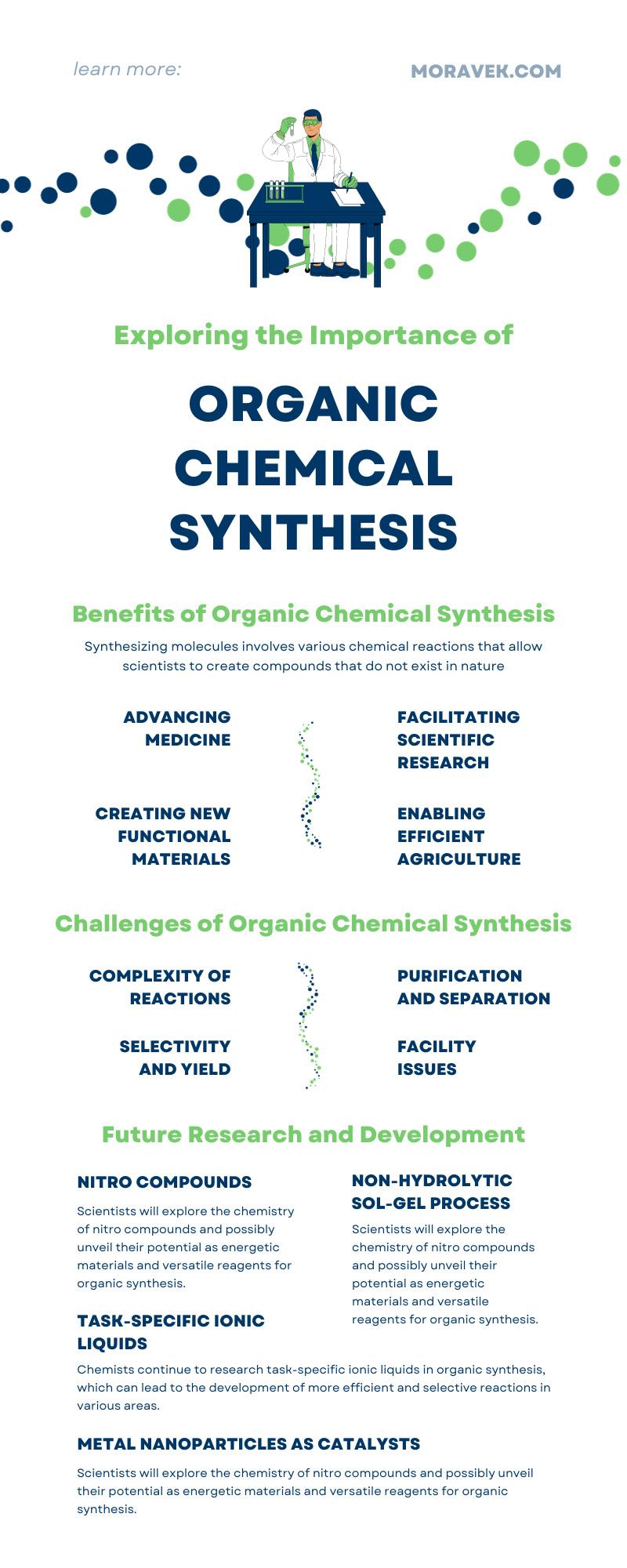
Organic chemical synthesis involves designing and creating complex organic compounds through a series of well-defined reactions. This process plays a vital role in various scientific fields, including pharmaceuticals, materials science, agriculture, and biochemistry. As you explore the importance of organic chemical synthesis, you’ll discover its unique qualities.
Explaining the Basics of Organic Chemical Synthesis
Organic chemical synthesis creates complex organic molecules from simple starting materials. It includes a series of planned reactions and transformations that produce the desired end product.
The process begins with selecting a starting material from natural sources. Chemists expose the materials to various chemical reactions, such as functional group transformations, bond formation or cleavage, and purification steps.
The reactions in organic synthesis follow principles of organic chemistry, like regioselectivity, stereoselectivity, and yield optimization. The goal of organic chemical synthesis is to create new compounds with specific properties and functions, such as pharmaceuticals, agrochemicals, and polymers.
Benefits of Organic Chemical Synthesis
Synthesizing molecules involves various chemical reactions that allow scientists to create compounds that do not exist in nature. Although organic synthesis is a relatively new field of chemistry, it revolutionizes research in various industries.
Advancing Medicine
Organic chemical synthesis plays a crucial role in the development of new medicines and drugs. Chemists can create and modify molecular structures to improve the effectiveness and safety of drugs. For example, scientists create medicines for treating cancer, diabetes, and heart disease with chemical synthesis.
Creating New Functional Materials
Organic synthesis lets scientists create new functional materials with unique properties. For example, scientists can create self-healing, water-resistant, or anti-corrosive substances. The materials have a wide range of applications, from biomedical implants to electronic devices.
Facilitating Scientific Research
Scientists can create molecules that are nearly impossible to obtain from natural sources, allowing them to study their properties and potential applications. This has led to many important discoveries and breakthroughs in chemistry and materials science.
Enabling Efficient Agriculture
Organic synthesis generates new chemicals that help farmers increase crop yield and control pests. In particular, the creation of synthetic plant hormones can improve a plant’s ability to absorb nutrients and withstand harsh weather conditions. Additionally, pesticides and herbicides can protect crops without harming the environment.
Organic Chemical Synthesis and Modern Medicine
Organic chemical synthesis is a crucial aspect of modern medicine; it contributes to the development of life-saving drugs and treatments. Notable and common medicines include pain relief medication and chemotherapy drugs.
While exploring the importance of organic chemical synthesis, it’s important to assess their role in the healthcare industry. Here’s more insight on treatments:
Organic synthesis allows chemists to produce different forms of non-steroidal anti-inflammatory drugs (NSAIDs). Chemists can alter their properties and improve their effectiveness. Popular NSAIDs include aspirin and ibuprofen; these drugs block the production of prostaglandins, which cause inflammation and pain.
Chemotherapy drugs are other examples of how organic chemical synthesis contributes to modern medicine. They treat cancer by targeting cancer cells, but they can also damage healthy cells. Fortunately, chemists can design new chemotherapy drugs that are more selective, meaning they only target cancer cells.
Organic chemical synthesis also contributes to the development of antibiotics, a vital component of modern medicine. Antibiotics can treat life-threatening bacterial infections. Over time, chemists can optimize medicines and make antibiotics that combat bacterial resistance, improving the efficacy of treatment and saving lives.
Challenges of Organic Chemical Synthesis
It’s important to note that researchers and chemists face several challenges that can impact the success of their experiments. Here are some common issues:
Complexity of Reactions
Organic synthesis involves complex reactions with multiple steps and intermediates. Understanding the reaction mechanisms and designing efficient pathways can be challenging for chemists.
Selectivity and Yield
Achieving high selectivity and yield is difficult due to side reactions, competing pathways, and undesired byproducts. Chemists can combat this by optimizing reaction conditions and employing protecting groups to enhance selectivity and maximize yields.
Purification and Separation
Purifying synthesized compounds and separating desired products from reaction mixtures are demanding tasks. Luckily, chromatography, distillation, crystallization, and extraction can help chemists achieve purity and isolate specific compounds.
Facility Issues
Surprisingly, facility size can play a role in synthesis. In particular, scaling up organic synthesis from laboratory-scale to industrial production can introduce new challenges. Issues related to reaction scalability, safety considerations, and cost-effectiveness are common. Fortunately, chemists can outsource radiosynthesisto trusted, third-party companies.
Cutting-Edge Technologies in Organic Synthesis
Organic synthesis is more than heating chemicals in a flask and observing the reaction. Significant technological advancements led to quick and efficient ways of producing complex molecules.
Automated systems can perform a wide range of tasks, from measuring reagents to mixing solutions and monitoring reactions. This saves time and labor while improving accuracy. Moreover, these systems can operate continuously, allowing researchers to work around the clock without interruption.
Flow chemistry, also known as continuous flow synthesis, involves performing reactions in a continuous flow of reactants. This technology offers several advantages, including improved reaction control, enhanced safety, and increased productivity.
Biorthogonal chemistry involves selective chemical reactions that can occur in living systems without the interference of biological processes. This technology has applications in bioconjugation, imaging, and drug delivery.
Photoredox catalysis utilizes light energy to induce redox reactions. This technique enables the generation of highly reactive species and the formation of complex molecular structures.
Although these are leading technologies, many more cutting-edge advancements support synthesis.
Future Research and Development
You can expect future research and developments in organic chemical synthesis. Check out these concepts to explore:
Nitro Compounds
Scientists will explore the chemistry of nitro compounds and possibly unveil their potential as energetic materials and versatile reagents for organic synthesis.
Task-Specific Ionic Liquids
Chemists continue to research task-specific ionic liquids in organic synthesis, which can lead to the development of more efficient and selective reactions in various areas.
Metal Nanoparticles as Catalysts
Further investigation into using metal nanoparticles or metal oxide nanoparticles as novel heterogeneous catalysts in organic synthesis holds the potential for enhancing reaction efficiency and selectivity.
Non-Hydrolytic Sol-Gel Process
Understanding the mechanisms and expanding the scope of the non-hydrolytic sol-gel process can open new avenues for synthesizing organic-inorganic hybrid materials with unique properties.
As researchers continue to dissect the intricacies of organic synthesis, they will uncover valuable insights into the structure-function relationships of molecules. The pursuit of innovative methods and cutting-edge technologies allows scientists to generate new medicines and improve other fields of study.

